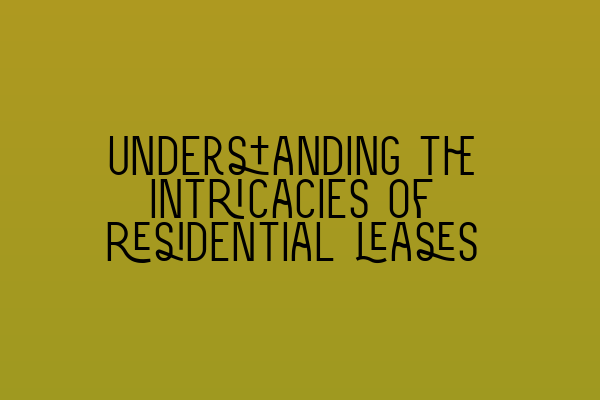Understanding the Intricacies of Residential Leases
When it comes to property law, residential leases are a vital aspect that both tenants and landlords should fully comprehend. Whether you are a first-time buyer or a seasoned investor, understanding the intricacies of residential leases can help you navigate the legal landscape and make informed decisions. In this blog post, we will delve into the key aspects of residential leases, explore common terminology, and provide valuable insights to help you grasp the essentials.
What is a Residential Lease?
A residential lease, also known as a tenancy agreement, is a legally binding contract between a landlord and a tenant. It outlines the terms and conditions of the tenancy, including the rights and responsibilities of both parties. It is important to note that residential leases can vary, often depending on the type of property and the nature of the tenancy.
Types of Residential Leases
There are several types of residential leases, each with its own unique characteristics. Let’s explore the most common types:
1. Assured Shorthold Tenancy (AST): AST is the most common type of residential lease in the UK. It provides tenants with a minimum fixed term of six months, after which the tenancy becomes periodic (rolling on a month-to-month basis) unless terminated by either party. For landlords, ASTs offer more flexibility in terms of repossession.
2. Rent Act Tenancy: Rent Act Tenancies are rare, dating back to the Rent Act 1977. They provide tenants with long-term security, as landlords can only regain possession in limited circumstances. These tenancies are governed by specific rules and regulations, so seeking professional advice is crucial.
3. Leasehold: Leasehold refers to the ownership of a property for a fixed period, typically long-term, but not indefinitely. Leasehold properties are subject to specific terms and ground rent, often with additional charges, such as service charges or maintenance fees.
Terms and Conditions of Residential Leases
Residential leases contain various terms and conditions that both landlords and tenants must abide by. Here are some important provisions commonly found in residential leases:
1. Rent: The lease will specify the amount of rent to be paid, the payment frequency, and the payment method. It may also include provisions regarding rent increases.
2. Term: The lease will indicate the duration of the tenancy, whether it is fixed-term or periodic.
3. Deposits: Many residential leases require tenants to pay a security deposit upfront, which is typically held in a government-approved tenancy deposit scheme. The lease will outline the circumstances under which the deposit may be withheld.
4. Repairs and Maintenance: The responsibilities for repairs and maintenance may be clearly defined in the lease, allocating specific tasks to either the landlord or the tenant.
5. Break Clause: Some leases include a break clause that allows either party to terminate the agreement before the fixed term expires. The conditions for exercising this clause will be outlined in the lease.
Understanding the intricate details of these terms and conditions is crucial for both landlords and tenants to ensure a smooth and mutually beneficial tenancy. It is recommended to seek legal advice to fully comprehend your rights and obligations under the lease.
Seeking Professional Assistance
Given the complex nature of residential leases, it is highly advisable to engage the services of a qualified solicitor specializing in property and land law. They can guide you through the legal complexities, review the lease agreement, and ensure that your rights are protected. At SQE Property Law & Land Law, our expert solicitors have extensive experience in residential lease matters, providing you with the necessary guidance and support.
Conclusion
Residential leases are a fundamental aspect of property law, and understanding their intricacies is crucial for both landlords and tenants. By comprehending the types of residential leases, key terms and conditions, and seeking professional assistance, you can navigate the legal landscape with confidence. If you require expert legal advice on residential leases or any other property matters, do not hesitate to reach out to SQE Property Law & Land Law.
To further enhance your understanding of property law and prepare for the SQE exams, we recommend checking out our related articles:
– SQE 1 Practice Exam Questions
– SQE 1 Practice Mocks FLK1 FLK2
– SQE 2 Preparation Courses
– SQE 1 Preparation Courses
– SRA SQE Exam Dates
By leveraging these educational resources, you can enhance your knowledge and excel in your property law journey. Remember, the more you understand about residential leases and property law, the better equipped you are to make informed decisions and protect your interests.
